#13-#15 are going to be written by A.L. Singer, but I don't know the titles yet.
JB: The third book The Fury of Darth Maul has an appearance by Maul's protocol droid C-3PX, a droid who would later become an assassin droid in Droids #3. Any other special cameos in the future?
 RW: Jorus C'Baoth had very brief appearance in the first Episode I Adventures book, but it was just a walk by, and he didn't have any dialogue. I don't have any other cameos planned, but it was fun to "introduce" C-3PX into the events of Episode I. I figured if Anakin Skywalker built C-3PO, why not have Darth Maul build C-3PX? I'd created C-3PX for the Dark Horse comic books, and even wrote the story outline, but for some reason (I can't recall) I gave the outline to writer Dan Thorsland and I wound up editing the comic. C-3PX turned out to be pretty popular. At some point, Anthony Daniels told me that he's been asked to autograph more copies of Droids #3, with C-3PX on the cover, than any other Star Wars comic.
RW: Jorus C'Baoth had very brief appearance in the first Episode I Adventures book, but it was just a walk by, and he didn't have any dialogue. I don't have any other cameos planned, but it was fun to "introduce" C-3PX into the events of Episode I. I figured if Anakin Skywalker built C-3PO, why not have Darth Maul build C-3PX? I'd created C-3PX for the Dark Horse comic books, and even wrote the story outline, but for some reason (I can't recall) I gave the outline to writer Dan Thorsland and I wound up editing the comic. C-3PX turned out to be pretty popular. At some point, Anthony Daniels told me that he's been asked to autograph more copies of Droids #3, with C-3PX on the cover, than any other Star Wars comic.
JB: Speaking of Droids, how did the idea of a Droids series come up? The three series really merged well with each other, even though they were written by three different authors. And what kind of research was done on the Droids cartoon?
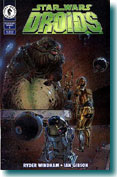 RW: The idea for Dark Horse's Droids comic book series began with Lucy Autrey Wilson, Lucasfilm's Director of Publishing. Dan Thorsland and I were editing the Star Wars comics at the time, around 1993, when Lucy suggested we develop a new series for C-3PO and R2-D2. Lucy is a big fan of Carl Barks' Donald Duck comics for Walt Disney, and encouraged us to create something in that tradition, mixing humor with adventure. In our pitch to Lucasfilm, Dan and I worked up several story ideas. After Lucasfilm approved them, I wound up hiring Dan to script most of the comics. I knew he could deliver good, tight scripts, and it just seemed silly to hand his outlines over to another writer. We did switch off on the editing/writing chores for one issue, Droids #5, which was actually the first comic book script I ever wrote.
RW: The idea for Dark Horse's Droids comic book series began with Lucy Autrey Wilson, Lucasfilm's Director of Publishing. Dan Thorsland and I were editing the Star Wars comics at the time, around 1993, when Lucy suggested we develop a new series for C-3PO and R2-D2. Lucy is a big fan of Carl Barks' Donald Duck comics for Walt Disney, and encouraged us to create something in that tradition, mixing humor with adventure. In our pitch to Lucasfilm, Dan and I worked up several story ideas. After Lucasfilm approved them, I wound up hiring Dan to script most of the comics. I knew he could deliver good, tight scripts, and it just seemed silly to hand his outlines over to another writer. We did switch off on the editing/writing chores for one issue, Droids #5, which was actually the first comic book script I ever wrote.
After the initial six-issue run, Peet Janes took over editing Droids. We agreed that any future Droids comics should follow the continuity that had been established by the first volume, so there was a deliberate effort to make the stories flow in a very linear fashion. As for the Droids cartoon series, I've only ever seen a few episodes. I did read through an episode guide, just to make sure that our comic book stories were substantially different from the animated series. No one likes a copycat.
The thing that really glued the series together was the artists. Bill Hughes and Andy Mushynsky collaborated on some issues, and Ian Gibson did the others. Cam Kennedy (Dark Empire) illustrated the cover for Droids #1, but all the other covers were done by Kilian Plunkett. They all did great work
with the droids.
JB:Donald Duck's influence really shows in your 3 droids Q-E, 2-E and U-E.
RW: I confess, I've always loved Carl Barks' comics, but it was Lucy Wilson's specific mention of his work that motivated me to create Q-E and 2-E, and U-E. I doubt I would have ever conceived them if she hadn't steered me in that direction, and I'm glad she did, because it gave me the idea for the story. Kilian Plunkett designed the Model E droids, and I did tell him that I envisioned them as a very affectionate tribute to Huey, Dewey, and Louie. I also talked with Ian Gibson, who illustrated that issue, about the tone of the thing, that there should be a childlike quality to the little droids.
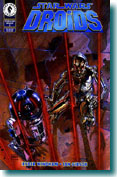 JB: You wrote the second series, Droids: Rebellion, which was then followed by Droids: Season of Revolt written by Jan Strnad. It's in your story that the droids meet an off-screen Han Solo on Nar Shaddaa. That was a nice touch. And also Threepio got his silver leg. Why did you give him a golden leg at the end of the series?
JB: You wrote the second series, Droids: Rebellion, which was then followed by Droids: Season of Revolt written by Jan Strnad. It's in your story that the droids meet an off-screen Han Solo on Nar Shaddaa. That was a nice touch. And also Threepio got his silver leg. Why did you give him a golden leg at the end of the series?
RW: I'm glad you liked seeing Han Solo's droid, Zee Zee. Since he wasn't even identified by name in Droids: Rebellion, I wasn't sure if readers would make the connection, but I'd enjoyed his appearance in Dark Empire and thought it would be a practical cameo for the sequence on Nar Shaddaa. At the end of the Droids: Rebellion, I made sure C-3PO had two golden legs (as opposed to a mismatched set) because I was reluctant to suggest that my story was some definitive account of how he wound up with a silver leg. In hindsight, I guess I could have gotten away with it, but I figured that C-3PO would probably go through a few more modifications before the events of Episode IV. I thought Jan Strnad did a great job when he picked up where I left off.
JB: Then you co-scripted The Protocol Offensive with the late Brian Daley. Your other stories have some references to Brian Daley's creations, like Etti IV and Bonadan. And I noticed you like to write fun, character-driven stories. Did Mr. Daley's contributions to the Star Wars universe influence your work in any way?
RW: Oh, definitely. I'd read all of Brian's Han Solo books when they first came out, and I really loved how he handled the characters. I remember telling him that one of my favorite scenes from his books was one where Solo tells Chewbacca a joke in a bar, and Solo delays the punchline until the moment Chewbacca takes a drink, and Chewbacca winds up spewing all over the place. I just thought it was such a great little scene, and totally in keeping with Han and Chewie. It's easy to write a sentence like, "They'd been friends for a long, long time," but Brian was able to illustrate the strength and nature of the friendship, and also helped connect the reader to the characters. It's difficult to identify with a pair of intergalactic smugglers, but Brian showed Han and Chewie could also be a just couple of guys, sitting around and telling jokes. Sure, there was also lots of action in the Daley books, but I thought it was the moments of humor that brought Han and Chewie to life. Brian's scripts for the Star Wars radio dramas are also filled with great moments of humor and character-defining dialogue. He was very, very good.
 JB:
JB: You have a story coming up in
Star Wars Tales #3. What can you tell us about it?
RW: It's an eight-page story featuring Jar Jar Binks, illustrated by Tom Fowler, and with a cover painting by Dave Dorman. My jaw dropped when I saw the painting, it's such a beauty. The title of the story is "The Death of Captain Tarpals." I can say no more!
JB: A disgruntled and embittered loser friend of mine known only as Number Eight wants to know how it feels to make #2 on the London Sunday Times bestseller list with Who's Who in Episode One.
RW: Please give my regards to Number Eight. I didn't even know that Who's Who had been on the bestseller list until Dan Wallace (author of numerous Star Wars books and magazine articles) brought it to my attention. Anyway, it was nice to know that the book did so well, and I hope Running Press will hire me on to write more Star Wars titles in the future. Since I suspect my name on the cover of any Star Wars book probably moves only about a dozen copies, I'd be deluded to think of myself as a bestselling author. Again, I'm just tickled that the people at Lucasfilm like my work and continue to keep me so busy.
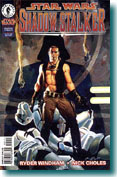 JB: I'm going to revert to my nit-picky fanboy personality now and ask some continuity questions. Your stories are very entertaining, and are well researched. For example, I liked the one shot Shadow Stalker because it guest-starred Frija and her father from the old Archie Goodwin newspaper strip "Iceworld", reprinted by Dark Horse in Classic Star Wars. And it was kind of a prelude to Shadows of the Empire.
JB: I'm going to revert to my nit-picky fanboy personality now and ask some continuity questions. Your stories are very entertaining, and are well researched. For example, I liked the one shot Shadow Stalker because it guest-starred Frija and her father from the old Archie Goodwin newspaper strip "Iceworld", reprinted by Dark Horse in Classic Star Wars. And it was kind of a prelude to Shadows of the Empire.
But one thing Darth Vader says gave me a continuity headache : "Months ago, on the planet Aridus, I nearly perished in an exploding tower." I could not figure out how "months" could have passed between the "Return of Ben Kenobi" and "Iceworld" strips when Goodwin's story is continuous! Can you explain?
RW: Hang on, let me take a look at the Goodwin/Williamson strips. Well, first, thanks for the nod about the research I do for my stories, and it's heartening to know you find them entertaining. I do try. Shadow Stalker came about when I was asked to write a serialized story about Jix that tied in with Shadows of the Empire, and I thought it would be interesting to incorporate some events from the comic strips by Goodwin and Al Williamson, of which I'm a huge fan.
Hmmm. No, I can't explain "months ago" except to say that I thought there was more time between the strips. Is it too late for me to get some liquid paper and waterproof ink and replace "months ago" with "recently" in every single printed copy? I'm sorry about this, and not just because it's an error. Allan Kausch, the continuity editor for Lucasfilm, will probably have my head on a platter.
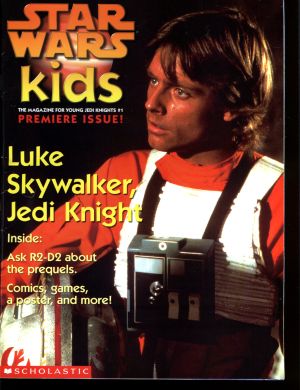 JB: You wrote the first of four comic strips in Sholastic's Star Wars Kids Magazine entitled "The Rebel Thief." It seems to be a continuation of the first four Star Wars Missions books which takes place the day after the Battle of Yavin. Was it tricky to write stories during that saturated period in Star Wars history? (I wonder why this story is reprinted last in the new fan club version of Star Wars Kids by the way...)
JB: You wrote the first of four comic strips in Sholastic's Star Wars Kids Magazine entitled "The Rebel Thief." It seems to be a continuation of the first four Star Wars Missions books which takes place the day after the Battle of Yavin. Was it tricky to write stories during that saturated period in Star Wars history? (I wonder why this story is reprinted last in the new fan club version of Star Wars Kids by the way...)
RW: Yes, it's increasingly tricky to find available periods for Star Wars stories. For Missions, I was told that the series had to be set during the events of the classic trilogy. Since Shadows of the Empire had already been done at that point, I suggested that Missions should be set immediately after the end of "A New Hope," and just before the events of the comics by Goodwin and Williamson. It's a pretty tight squeeze, but the folks at Lucasfilm thought it would work too.
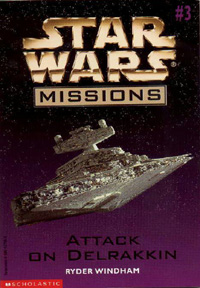 As I recall, I'd already written a few of the Missions books when I was hired to write the serial for Star Wars Kids. I remember talking with Dan Madsen, who was initially in charge of Star Wars Kids, about making the comic tie in with the Missions books, and he liked the idea, and said he also liked the floating orb-shaped droid, Q-7N, that I'd invented as a character who could be free to converse with the reader during the books' interactive game sequences.
As I recall, I'd already written a few of the Missions books when I was hired to write the serial for Star Wars Kids. I remember talking with Dan Madsen, who was initially in charge of Star Wars Kids, about making the comic tie in with the Missions books, and he liked the idea, and said he also liked the floating orb-shaped droid, Q-7N, that I'd invented as a character who could be free to converse with the reader during the books' interactive game sequences.
JB: The last Missions story arc guest-stars Rogue Squadron. When exactly does this story take place and when do you figure Rogue Squadron was formed?
RW: I knew that Rogue Squadron or Rogue Group existed by the time of "The Empire Strikes Back," and I figured that it might have had a slightly earlier incarnation on Yavin Four, after the destruction of the first Death Star. The last Missions story arc was still set before the Goodwin/Williamson comic strips. Back when I was working on Missions, I had a few long conversations with Michael Stackpole (author of the X-Wing novels and comic books) about which members of Rogue Squadron would have been on Yavin Four at the time, and he helped fill me in on the process for manufacturing bacta, which was major plot element of the series.
JB: My friend Abel Pena said you're one of the most informed writers that is working in the Star Wars universe. He wants to know how do you "train" for writing in the Star Wars world: do you read all this stuff in your spare time, listen to audio books to get a general idea? Were there any ideas for stories you had that you were not allowed to do? What does you consider your best Star Wars work?
RW: Abel "Halagad" Pena said that about me? Wow. Actually, I think Dan Wallace is the most informed Star Wars writer. I'm amazed by how much he knows. I haven't read all the novels, but I've read most of them. It's the reference books that get the most use in my library. Honestly, I owe more to Dan Wallace, Steve Sansweet, Bill Smith, and David West Reynolds than I can say. Also, Allan Kausch, Jane Mason, and Sarah Hines-Stephens at Lucas Licensing are super helpful whenever I have questions or need reference.
Typically, an assignment begins like this: I get a call from an editor, asking if I might be interested or available to work on a Star Wars project. I always say yes, even if I'm currently swamped, because I just can't resist. I try to find out everything I can about the project's parameters: which characters I should use, which settings, the page count, etc. As soon as I learn the parameters, I begin research on the characters and time period, and read any relative books. If I don't have some obscure reference material, I call Allan.
One book that involved more work than it might seem, given its format, was Episode I Who's Who. After I'd been hired by Running Press, I had to fly to Skywalker Ranch, read the screenplay, which was still under lock and key at the time, and jot down notes about the various characters. Allan showed me sketches of the Jedi Council members and the Podracers, and they all had names. But except for Mace Windu, Yoda, and Sebulba, there wasn't any biographical information for the other Jedi or aliens. Even though each character's bio was only a couple of sentences, I got to invent their respective species and homeworlds as well as other personal details. For the Podracer entries, I thought it would have been boring if they were all just professional competitors, so I made some of them hitmen, novices, revenge-minded goons, and so on. Reading through the entries, I think readers will get a sense that there's a sprawling backstory behind the Boonta Eve Race. When I was done with Episode I Who's Who, I hoped I'd be hired to write a novel about the Podracers.
One story idea I wasn't able to work on was about what happens to Darth Vader immediately after the destruction of the first Death Star. Back when I was writing Missions for Scholastic, I'd proposed a story about Vader and his damaged TIE fighter because it fit in with the timeline of the other Missions books. I even did research! I'd read through the Goodwin/Williamson comic strips, since they were also between Episodes IV and V, and thought it was interesting that they never revealed how Darth Vader learned Luke Skywalker's identity, that it was Luke who destroyed the Death Star. I found the first point in the strip where Darth Vader refers to Luke Skywalker by name, and worked backwards from there. The more I read, the more questions I drummed up, like, How long did it take for Darth Vader to reach an Imperial outpost? Why wasn't the Emperor on the Death Star at Yavin? Drawing from Dark Empire, I thought it was conceivable that Palpatine was in the process of assuming a new clone body during the events of Episode IV. Anyway, I thought my proposal logically tied in with the existing continuity, but by the time I presented it, I found out that Dark Horse Comics had just submitted an outline for Vader's Quest to Lucasfilm, and that this series covered the same time period. I did manage to incorporate some aspects of my original proposal into Darth Vader's Return (Star Wars Missions #17).
As for what I'd consider my best Star Wars work, I just don't know. I'm very critical of my own work, and often wonder if I could have done something better. The best is whatever made a reader grin and want to turn the next page instead of wince and try to get a refund in full. But if I had to pick a favorite comic, I'd go with Droids #5, the story about Q-E, 2-E, and U-E. Like I said, it was the first comic I ever wrote, and I still think it was pretty good for a first effort.
JB: Let's talk about your current series for DC Comics "Trouble Magnet: The Adventures of Witlock the Robot." I greatly enjoyed the series so far. What's the response from other readers?
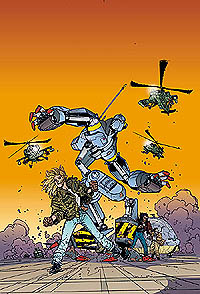 RW: Thanks for reading "Trouble Magnet"! For those who haven't seen it yet, "Trouble Magnet" is a four-issue series about a robot named Witlock who's trying to recover his stolen memory bank. I think of it as a mystery thriller disguised as science fiction slug fest. I wrote the script, and the art is by Kilian Plunkett. "Trouble Magnet" got a great write up in a recent issue of Starlog (#270), and also high marks from Andrew Smith in his syndicated column, Captain Comics. We haven't received much of response from readers yet, just few messages by way of our website, Trouble Magnet, which has an E-mail address (witlock@yahoo.com). Both Kilian and I love working on Star Wars comics, but it was a real thrill to work on our own creative property for a change.
RW: Thanks for reading "Trouble Magnet"! For those who haven't seen it yet, "Trouble Magnet" is a four-issue series about a robot named Witlock who's trying to recover his stolen memory bank. I think of it as a mystery thriller disguised as science fiction slug fest. I wrote the script, and the art is by Kilian Plunkett. "Trouble Magnet" got a great write up in a recent issue of Starlog (#270), and also high marks from Andrew Smith in his syndicated column, Captain Comics. We haven't received much of response from readers yet, just few messages by way of our website, Trouble Magnet, which has an E-mail address (witlock@yahoo.com). Both Kilian and I love working on Star Wars comics, but it was a real thrill to work on our own creative property for a change.
JB: I must admit that I was interested in this series only because of yours and Kilian's past Star Wars and Aliens work. But I was pleasantly surprised by the story, which is kind of a mystery/suspense yarn. Of course the art is always great! I don't read DC comics (except for their Cliffhanger line), but I was wondering if Witlock was part of the DC heroes universe. Any chance of a cross-over?
RW: Since "Trouble Magnet" is a creator-owned book, it's not part of the DC universe, where only corporately-owned characters may roam and fight. I'm certainly up for a cross-over. I think it would be a gas to see Witlock teamed with some of the more bizarre characters, like Martian Manhunter, Metamorpho, or the Doom Patrol.
JB: I get the impression that you and Kilian Plunkett are very good friends and this is your dream project.
RW: I won't get all mushy, but yeah, I'd take a bullet for Kilian, even though it might be his own fault for aiming at me in the first place. A few years after I left Dark Horse, Dan Thorsland (who was by that time working for DC Comics) suggested that Kilian and I collaborate on a robot comic book series. As far as I'm concerned, Kilian could work with any writer he wanted, so I was knocked out when he said he was up to working with me. We both had other projects to complete first, but we finally got around to "Trouble Magnet." Before I wrote the scripts, Kilian told me his story ideas, and before Kilian penciled any pages, I drew up layouts for his consideration. In that sense, producing the comic was truly a collaborative process, which I found most rewarding. If the four-issue series does well, I really hope we can do another.
JB: What does the future have in store for you? Any more adventures for Witlock? Any future Star Wars projects?
RW: After I finish Episode I Adventures, I'll be working on the screenplay for "Trouble Magnet" Kilian and I are aiming to develop "Trouble Magnet" for games and toys. We think it would be great fun to play a computer game that has Witlock searching for his lost memories, and having him get increasingly stupid over the course of the game. Kilian is currently writing and illustrating "Dim Forces" for Star Wars Tales, and anyone who enjoyed The Jabba Tape or ever played Dark Forces will definitely want to check it out. I have a few other comic book projects that are in development, but nothing's contracted yet. Cam Kennedy and I want to collaborate on something, and I'm also talking with Mike Manley ("Superman Adventures", "Action Planet") about working together on an online comic.
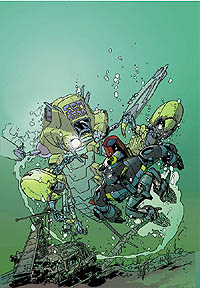 A few months ago, I finished writing a Star Wars Masterpiece Edition for Chronicle Books. Like the previous Masterpiece Editions, this boxed set will include both a twelve-inch collectors' figure and a hardcover book about a Star Wars character. Until Lucasfilm makes an announcement, I can't disclose the
title of the project or identify the collectors' figure, but I think it's okay if I say that the book is loaded with exclusive photographs and illustrations that have never been previously published.
A few months ago, I finished writing a Star Wars Masterpiece Edition for Chronicle Books. Like the previous Masterpiece Editions, this boxed set will include both a twelve-inch collectors' figure and a hardcover book about a Star Wars character. Until Lucasfilm makes an announcement, I can't disclose the
title of the project or identify the collectors' figure, but I think it's okay if I say that the book is loaded with exclusive photographs and illustrations that have never been previously published.
I also wrote a series of mini-comics about the Podracers, which was fun because I got to expand on the Podracers' brief biographies that I'd written for Episode I Who's Who. I don't know when Dark Horse will be releasing the mini-comics, but I'll keep you posted. Beyond that, I'm hoping to be as busy with Episode II projects as I've been with Episode I.
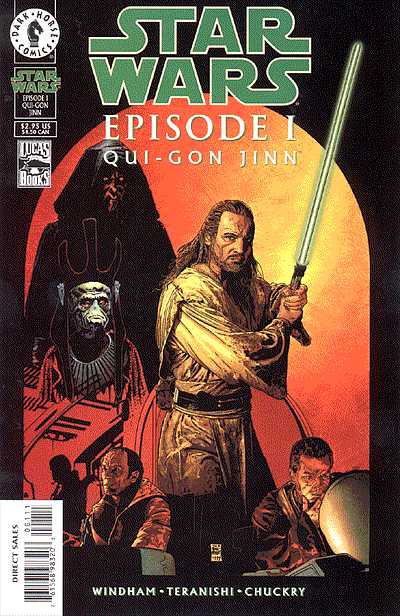
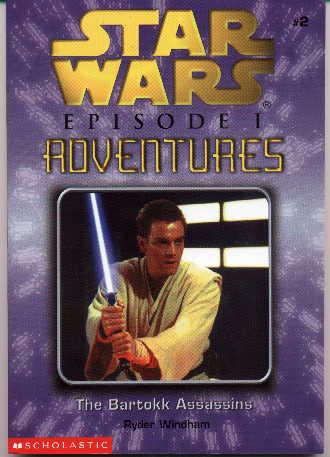 Episode I Adventures #1-4 by Ryder Windham
Episode I Adventures #1-4 by Ryder Windham RW: Jorus C'Baoth had very brief appearance in the first Episode I Adventures book, but it was just a walk by, and he didn't have any dialogue. I don't have any other cameos planned, but it was fun to "introduce" C-3PX into the events of Episode I. I figured if Anakin Skywalker built C-3PO, why not have Darth Maul build C-3PX? I'd created C-3PX for the Dark Horse comic books, and even wrote the story outline, but for some reason (I can't recall) I gave the outline to writer Dan Thorsland and I wound up editing the comic. C-3PX turned out to be pretty popular. At some point, Anthony Daniels told me that he's been asked to autograph more copies of Droids #3, with C-3PX on the cover, than any other Star Wars comic.
RW: Jorus C'Baoth had very brief appearance in the first Episode I Adventures book, but it was just a walk by, and he didn't have any dialogue. I don't have any other cameos planned, but it was fun to "introduce" C-3PX into the events of Episode I. I figured if Anakin Skywalker built C-3PO, why not have Darth Maul build C-3PX? I'd created C-3PX for the Dark Horse comic books, and even wrote the story outline, but for some reason (I can't recall) I gave the outline to writer Dan Thorsland and I wound up editing the comic. C-3PX turned out to be pretty popular. At some point, Anthony Daniels told me that he's been asked to autograph more copies of Droids #3, with C-3PX on the cover, than any other Star Wars comic. RW: The idea for Dark Horse's Droids comic book series began with Lucy Autrey Wilson, Lucasfilm's Director of Publishing. Dan Thorsland and I were editing the Star Wars comics at the time, around 1993, when Lucy suggested we develop a new series for C-3PO and R2-D2. Lucy is a big fan of Carl Barks' Donald Duck comics for Walt Disney, and encouraged us to create something in that tradition, mixing humor with adventure. In our pitch to Lucasfilm, Dan and I worked up several story ideas. After Lucasfilm approved them, I wound up hiring Dan to script most of the comics. I knew he could deliver good, tight scripts, and it just seemed silly to hand his outlines over to another writer. We did switch off on the editing/writing chores for one issue, Droids #5, which was actually the first comic book script I ever wrote.
RW: The idea for Dark Horse's Droids comic book series began with Lucy Autrey Wilson, Lucasfilm's Director of Publishing. Dan Thorsland and I were editing the Star Wars comics at the time, around 1993, when Lucy suggested we develop a new series for C-3PO and R2-D2. Lucy is a big fan of Carl Barks' Donald Duck comics for Walt Disney, and encouraged us to create something in that tradition, mixing humor with adventure. In our pitch to Lucasfilm, Dan and I worked up several story ideas. After Lucasfilm approved them, I wound up hiring Dan to script most of the comics. I knew he could deliver good, tight scripts, and it just seemed silly to hand his outlines over to another writer. We did switch off on the editing/writing chores for one issue, Droids #5, which was actually the first comic book script I ever wrote. JB: You wrote the second series, Droids: Rebellion, which was then followed by Droids: Season of Revolt written by Jan Strnad. It's in your story that the droids meet an off-screen Han Solo on Nar Shaddaa. That was a nice touch. And also Threepio got his silver leg. Why did you give him a golden leg at the end of the series?
JB: You wrote the second series, Droids: Rebellion, which was then followed by Droids: Season of Revolt written by Jan Strnad. It's in your story that the droids meet an off-screen Han Solo on Nar Shaddaa. That was a nice touch. And also Threepio got his silver leg. Why did you give him a golden leg at the end of the series?
 JB: I'm going to revert to my nit-picky fanboy personality now and ask some continuity questions. Your stories are very entertaining, and are well researched. For example, I liked the one shot Shadow Stalker because it guest-starred Frija and her father from the old Archie Goodwin newspaper strip "Iceworld", reprinted by Dark Horse in Classic Star Wars. And it was kind of a prelude to Shadows of the Empire.
JB: I'm going to revert to my nit-picky fanboy personality now and ask some continuity questions. Your stories are very entertaining, and are well researched. For example, I liked the one shot Shadow Stalker because it guest-starred Frija and her father from the old Archie Goodwin newspaper strip "Iceworld", reprinted by Dark Horse in Classic Star Wars. And it was kind of a prelude to Shadows of the Empire.  JB: You wrote the first of four comic strips in Sholastic's Star Wars Kids Magazine entitled "The Rebel Thief." It seems to be a continuation of the first four Star Wars Missions books which takes place the day after the Battle of Yavin. Was it tricky to write stories during that saturated period in Star Wars history? (I wonder why this story is reprinted last in the new fan club version of Star Wars Kids by the way...)
JB: You wrote the first of four comic strips in Sholastic's Star Wars Kids Magazine entitled "The Rebel Thief." It seems to be a continuation of the first four Star Wars Missions books which takes place the day after the Battle of Yavin. Was it tricky to write stories during that saturated period in Star Wars history? (I wonder why this story is reprinted last in the new fan club version of Star Wars Kids by the way...) As I recall, I'd already written a few of the Missions books when I was hired to write the serial for Star Wars Kids. I remember talking with Dan Madsen, who was initially in charge of Star Wars Kids, about making the comic tie in with the Missions books, and he liked the idea, and said he also liked the floating orb-shaped droid, Q-7N, that I'd invented as a character who could be free to converse with the reader during the books' interactive game sequences.
As I recall, I'd already written a few of the Missions books when I was hired to write the serial for Star Wars Kids. I remember talking with Dan Madsen, who was initially in charge of Star Wars Kids, about making the comic tie in with the Missions books, and he liked the idea, and said he also liked the floating orb-shaped droid, Q-7N, that I'd invented as a character who could be free to converse with the reader during the books' interactive game sequences. RW: Thanks for reading "Trouble Magnet"! For those who haven't seen it yet, "Trouble Magnet" is a four-issue series about a robot named Witlock who's trying to recover his stolen memory bank. I think of it as a mystery thriller disguised as science fiction slug fest. I wrote the script, and the art is by Kilian Plunkett. "Trouble Magnet" got a great write up in a recent issue of Starlog (#270), and also high marks from Andrew Smith in his syndicated column,
RW: Thanks for reading "Trouble Magnet"! For those who haven't seen it yet, "Trouble Magnet" is a four-issue series about a robot named Witlock who's trying to recover his stolen memory bank. I think of it as a mystery thriller disguised as science fiction slug fest. I wrote the script, and the art is by Kilian Plunkett. "Trouble Magnet" got a great write up in a recent issue of Starlog (#270), and also high marks from Andrew Smith in his syndicated column,  A few months ago, I finished writing a Star Wars Masterpiece Edition for Chronicle Books. Like the previous Masterpiece Editions, this boxed set will include both a twelve-inch collectors' figure and a hardcover book about a Star Wars character. Until Lucasfilm makes an announcement, I can't disclose the
title of the project or identify the collectors' figure, but I think it's okay if I say that the book is loaded with exclusive photographs and illustrations that have never been previously published.
A few months ago, I finished writing a Star Wars Masterpiece Edition for Chronicle Books. Like the previous Masterpiece Editions, this boxed set will include both a twelve-inch collectors' figure and a hardcover book about a Star Wars character. Until Lucasfilm makes an announcement, I can't disclose the
title of the project or identify the collectors' figure, but I think it's okay if I say that the book is loaded with exclusive photographs and illustrations that have never been previously published.